- Home
- J. Clifton Slater
Bloody Water (Clay Warrior Stories Book 3) Page 2
Bloody Water (Clay Warrior Stories Book 3) Read online
Page 2
Alerio was just behind the first swimmer, yet he ended up on the opposite side of the rotating patrol boat.
The Legionaries pulled on the rails and both came out of the water at the same time. As their arms hoisted their chests to gunwale height, they looked down into the boat.
A Legionary with one arm leaned unconscious on the rearward-facing oar. The nub of the other arm was tied off at his bicep. Three bodies lay on the central beam unmoving. The last occupants were ten men slumped over their oars. All ten were dripping fat, red drops into the bloody water in the bottom of the boat.
As the other three trainees climbed in, Alerio said to the smallest, “Take the rear oar. Guide us into mid channel. We’ll use the northern current to help us.”
With only four oarsmen, it was impossible to move the patrol boat against the southern current running along the beach. Once over the edge of the opposing currents, they rowed with the flow.
Martius watched from the beach. Behind the Sergeant, ranks of men stood at the ready.
Alerio didn’t call for a reverse stroke as the boat neared the beach. He let it run hard onto the sand between the waiting Legionaries.
“Medics, stand by! We’ll bring the wounded to you,” shouted Martius once he saw the slaughterhouse of the interior. To the Legionaries, he ordered, “Lift them out and carry the wounded to the Medics.”
Once all fourteen injured were in the treatment area, Alerio walked down to the boat. Martius was leaning in and pulling gladii, javelins, and arrows from the red tinted water.
“The proper order is to back-it-down,” the Sergeant scolded as Alerio neared.
“With only four oarsmen, we were barely able to keep forward movement,” explained Alerio. “I was afraid if we slowed, the boat would stall away from the beach.”
“What you need to be afraid of are hidden rocks ripping out the bottom of my boat,” Martius sneered as he pulled another gladius from the water and tossed it to the sand. “If you land a boat that fast on an uncharted beach, you’ll be marching back to Rhegium. Where I might add, I’ll be waiting to ask you about my boat.”
“I understand, Sergeant,” replied Alerio. “What happened to the boat’s crew?”
“That’s a good question Lance Corporal Sisera,” Martius remarked as he pulled an arrow from the wood of the gunwale. “Let’s go find out.”
The fourteen Legionaries were laid out in a circle with their feet toward the center. Medics were bent over the living. The dead required no treatment.
“They are all that’s left of our three-squad garrison at Occhio,” a Centurion said as Martius and Sisera approached. “A merchant ship came up the inlet and its Captain started yelling for the Legionaries. Ten men and their Sergeant began rowing across the river. Before they could reach the merchant, an Illyrian bireme came upstream.”
“What was so valuable a pirate ship would dare attack a settlement with a Legion garrison?” asked Martius.
“No one knows. The Illyrian ship cut between the patrol boat and our garrison dock,” continued the Centurion. “With our forces split, the Legionaries couldn’t link up. The Illyrians rained arrows and spears down on the patrol boat while sending fighters down a ramp to the Legion’s dock.”
“The Legionaries on the garrison side fought a retreat down river,” reported the Centurion. “Once the patrol boat managed to get out from under the shadow of the Illyrian ship, they rowed to meet them. One squad leader and three men formed a shield wall on the riverbank. They held off the Illyrians while the injured jumped for the boat. The fourteen who rowed back are the only survivors.”
The officer glanced at the circle of wounded and dead Legionaries. He shook his head before turning back to the Sergeant.
“Or should I say, these are the ones who made it back,” he said before his eyes narrowed. “I want these pirates up on crosses; every last one of them. But, they’ll be gone by morning. We can’t counterattack, and we have no way of knowing why they attacked a Legion guarded at a farming village.”
It was late in the day. Half the sun had dipped below the mountaintop on the island across the Massena Strait.
“I don’t understand, Sir,” Alerio said. “Why can’t we go after them now?”
“Because our Legionaries are scattered up and down the coast,” the Centurion explained. “It’ll take half the night to gather our forces. We’ll have to wait for sunrise to move our ships and men down the coast for a coordinated attack.”
“And the pirates will row out at first light?” ventured Alerio.
“That’s right. Without a direction, we wouldn’t know where they’re headed,” said the Centurion. “They’ll be at sea before we arrive.”
“Let me take a crew and drop off a spotter,” offered Martius. “It’s only five miles to the beach at the Occhio inlet. The farming village and docks are a little over mile inland. Once our spotter is landed, we’ll breach at Point Ravagnese and watch for his signal.”
“Do you have someone in mind for the job?” asked the Centurion.
“Excuse me, Sir,” broke in Alerio. “I’d like to volunteer. I’ve had experience sneaking up on rebels. I can’t imagine pirates will be much different.”
“Sergeant. Your opinion?” inquired the officer.
“If Lance Corporal Sisera wants the job, it’s fine with me,” Martius said. “But, we need to get started before it’s fully dark.”
“All right Sisera. You’re our spotter,” the Centurion ordered. “Gear up and go with the Sergeant.”
“Yes, Sir. Sergeant Martius can you have someone load my armor in the boat?” asked Alerio. “If I’m going to sneak around, I’ll need to grab something from my quarters first.”
Act 2
Chapter 6 - Moonless Rowing
Martius clutched and unclutched the rearward facing oar handle while he bobbed in the patrol boat. His fifteen oarsmen on the port side were holding water. The fifteen on the starboard side were standing in knee-deep water and holding the gunwale to keep the boat near the shore.
The Sergeant watched as the young Lance Corporal jogged onto the beach. Leather straps fell over his shoulders and the Legionary was fastening them together as he ran. When he neared the boat, Martius noticed two gladii hilts jutting up on either side of Sisera’s neck.
“Starboard side, push off and fall in,” Martius ordered as Alerio climbed over the side. The fifteen rowers on the left shoved the patrol boat and scurried over the gunwale. Once they had their oars in hand, the Sergeant announced, “Rowers, standby. Stroke, stroke, stroke.”
Martius shoved the rear oar so the patrol boat angled away from the shoreline as it surged ahead. Unlike the underpowered river patrol boat the training unit had rowed earlier, the larger patrol boat with thirty oars cut sharply through the salty water of the strait.
“Here’s a fire kit,” Martius said handing Alerio a small wooden box sealed in wax. “If the Illyrians row straight out of the inlet light one signal fire to indicate they’re heading for Sicilia across the strait. Light two if they turn south and set sail; that means they’re heading for open water and home. If they turn south and continue rowing, light three. That would be the best scenario for us because they’re staying near our shoreline. We can then hunt them down and crucify the cūlus pirates.”
“What if they stay at the dock?” Alerio asked.
“Then they are stupid and they will die,” Martius replied.
***
The patrol boat cruised south as the sunlight faded. Even when darkness fell and the shoreline vanished, the oarsmen continued their steady strokes.
“Are you navigating by the stars?” inquired Alerio. “I’ve heard mariners can do that.”
“No Lance Corporal. I’m using the fires from the fishing village at Point Ravagnese as a guide,” Martius replied. “Their cook fires will show me the point. We’ll turn once the flames are behind us.”
In the distance, several candle sized flames danced in the dark. As the patrol boat tra
veled, the lights moved from ahead to off the starboard side. When the fishermen’s fires were over their left shoulders, Martius eased the oar so the boat curved toward the invisible shoreline.
“Back it down,” called the Sergeant and the oarsmen reversed their stroke. “Let her run.”
With the patrol boat slowed from the backstroke and the oars hovering over the water, the boat gently nudged into the dark beach.
“The inlet is off to your right. Follow the beach,” Martius directed. “As you face inland, the garrison, fields, and grain storage buildings are on the right bank. The village is on the left bank and uphill from the water.”
“Why is the village not near the fields?” Alerio asked. The farmer’s son couldn’t understand the unusual layout.
“Flooding. In the spring and after heavy rains in the mountains, the fiumare at the end of the inlet, floods over its banks,” advised Martius. “The fields flood and the garrison building floods. We have to rebuild the stockade every year. Now go.”
Alerio slid over the side and into the chest deep water. Holding his armor and helmet over his head, he waded toward the beach. Behind him, he heard Martius call to the oarsmen.
“Back her down. Back. Back,” the Sergeant ordered as the patrol boat moved away from the shore.
Chapter 7 - Survivor
Alerio heard the waves lapping at the shoreline. Where the land curved around forming the bank of the inlet, he dropped his armor and helmet on the rocky beach. By following the curving bank, he arrived at an area with thick reeds and a crop of trees. There he collected an armload of dry branches.
Back on the beach, he piled dirt into three piles before patting the top of each flat. From behind his back, Alerio pulled a long, curved dagger with one yellow stripe on the black hilt. It was more than a fine weapon. It identified him as an Ally of the Golden Valley, and a friend to the valley’s protectors’ the assassins of the Dulce Pugno. After shaving off kindling with the knife, he tented branches and the thin wood strips on the raised flat surfaces. Finally, he dug out a depression in the beach and laid branches in the bottom.
Once the three unlit signal fires were set, he unstrapped the duel gladii rig and downed his armor and helmet. He resettled the duel gladii harness over his armor and tied it down before setting off toward the village of Occhio.
A mile in daylight over roughly plowed fields was a simple march. In the dark, it was torturous and bruising on the ankles and knees. Alerio smiled at the mounds and valleys of the planted rows, the smell of freshly turned soil, and the aroma of green growing plants. It reminded him of home.
The fields on the flat land soon transitioned to cultivated hillsides. As Alerio climbed, he left the small grain field behind and arrived at a row of beans. His early work on a farm prevented him from simply bashing through the vine plants. Out of respect for the farmers, he walked to the end of the row.
“You can’t go,” a voice whispered from a few rows to the front.
Drawing his hip gladius, Alerio crept forward.
Another voice choked back a reply, “I’ve got to free them.”
A third voice caused Alerio to relax.
“Lance Corporal, you’re injured,” a man said. “If you stumble into the pirates in your present condition, you will be killed.”
“Someone has to…” and the voice trailed off.
“How is he?” another voice asked. “Is he dead?”
“No. But his breathing is ragged and shallow,” came the reply.
Alerio looked up to see a slice of the moon over the mountain. He squatted down to wait. Shortly, there would be some illumination. He figured it was better to meet the voices in shadowy moonlight rather than stumbling into a group of strangers in total darkness.
“What are we going to do?” pleaded a man.
“There’s not much a handful of farmers can do against those Illyrians,” came the reply. “If we rush down there, we’ll be killed.”
The half-moon drifted slowly above the mountain spilling weak light over the bean rows.
“Stand down citizens,” Alerio said as he quickly moved to the group. “I’m a Legionary. Lance Corporal Sisera. What’s going on here?”
The question was asked for two reasons. One was to occupy the farmers so they would think instead of attacking a form appearing from the dark. The other reason, Alerio was curious.
“Is the Legion here?” a man asked hopefully.
“Not until morning,” Alerio responded.
“It’ll be too late,” another farmer whined. “They’ll row out at first light. It’ll be too late.”
“First things first,” Alerio said. “Where is the Lance Corporal?”
“He’s here. We fished him out of the water after the Illyrians knocked him off the bank,” a kneeling man reported. “He must have been alert enough to take off his armor. When he floated to the surface, we paddled out and brought him to shore. I’m afraid he’s cut up bad. I’ve bandaged him but he’s not doing well.”
Alerio dropped to his knees and ran a hand over the Legionary. Rough cloth covered his arms and lower legs but the worrisome bandage was the wet cloth wrapped around his stomach. Light wasn’t necessary to recognize the sticky dampness. It was blood.
“Thank you for taking care of him,” Alerio offered. “Now. Why will the morning be too late? Too late for what?”
“They’ve rounded up our old, our women, and our children,” stated another man. “They said if we attack they’d cut their throats.”
“They’ll take them as slave when they row out,” said another man. “It’s the fault of the merchant ship that brought them.”
“What was so important about the merchant that the Illyrians chanced attacking a Legion garrison?” asked Alerio.
“We’ve discussed that but we have no idea,” a farmer admitted. “Other than piracy.”
“The man they took off the merchant ship was tall, thin and swarthy,” said the farmer kneeling beside the wounded Legionary. “He was dressed in a gold embroidered robe.”
“Him and the four slaves carrying the big coin chest,” another farmer added. “And a man in strange pants toting the stacks of parchment and scrolls.”
“The coin chest is enough to warrant an attack,” Alerio offered. “Tell me about your families?”
“The Illyrians rounded up everyone in the village. Then they marched them across the fiumare,” a man reported. “We were in the fields and couldn’t get back in time. Their leader said if we attack they’d kill them all. Now, our families are under guard in the grain storage building.”
“How many?” inquired Alerio.
“Forty-five,” came the answer.
“Forty-five guards?” asked a shocked Alerio.
“No, no, women, children and our elders,” the farmer corrected. “There are six Illyrians guarding them. Can you help us?”
Alerio was conflicted. On one hand, he had an assignment to report the direction of the Illyrian ship. On the other hand, he was confronted with the need to save a farming community. However, if killed in the process, he wouldn’t complete his initial assignment.
From the bean terrace, he could see moonlight on the inlet. Gentle ripples flowed down toward the strait. Across the water, the fields were black with no surface to reflect light.
“Where is the grain storage building?” he asked.
“You can’t see it from here. The hills with our village block the view,” the kneeling man said. “Can you? Will you help us?”
“I need you to carry the Lance Corporal to the crop of trees at the beach and hide there,” answered Alerio. “When the Illyrian ship leaves, you’ll need to light signal fires to alert the Legionaries. If you do that, I’ll free your families. Or die trying.”
“Oh, Laetitia blesses us this night,” a farmer gushed.
“Don’t celebrate yet,” warned Alerio. “Let me rescue them before you start invoking a Goddess.”
“Still, you’ve given us hope,” the kneeling ma
n said. “We’ll carry the Lance Corporal to the beach and come back to help you.”
“No. I’ll need two men to guide me to your families,” instructed Alerio. “If I have too many citizens running around in the dark…Let’s just say someone could get hurt if it becomes a melee.”
“Cimon. Marcissus. Go with the Legionary,” the kneeling man ordered. “Row him across and show him the grain storage building. Then, follow his directions.”
Two men stepped closer to Alerio. One was tall and thin while the other was short and stocky.
“I’m Cimon,” the thin farmer said. “He’s Marcissus. When do we get started?”
“As soon as the rest are on the way to the beach,” Alerio told him.
It took little time for two farmers to pull up the anchoring poles from the bean rows. Soon they had strips of goatskin stretched between the poles and the injured Legionary placed on the stretcher. As the group of twenty-three farmers moved down the terrace, Alerio turned to Cimon and Marcissus.
“Two questions. How do we cross the inlet?” he asked. “And, what material did you use to construct the grain storage building?”
“We have a flat bottom boat,” Marcissus replied. “We use it to transfer men and supplies across the inlet. We can row you all the way to where the inlet meets the fiumare.”
“No. We’ll cross here and approach from the fields behind the building,” Alerio explained. “What about the storage building?”
“It’s brick,” Cimon stated with pride. “Brick with a mud layer. Our productivity is good because we don’t lose the harvest to rats or rot when it rains.”
“At my father’s farm, the village’s storage buildings have brick for the first three feet and the rest is wood,” said Alerio.
“You’re a farmer?” asked Marcissus.
“My father is the farmer. I’m a simple Legionary,” Alerio replied. “And we have a mission. Show me to the boat.”

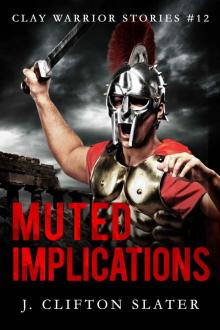 Muted Implications (Clay Warrior Stories Book 12)
Muted Implications (Clay Warrior Stories Book 12)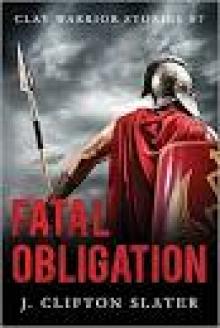 Fatal Obligation
Fatal Obligation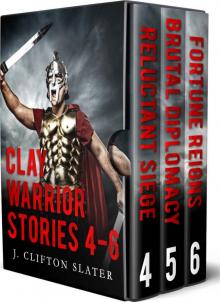 Clay Warrior Stories Boxset 2
Clay Warrior Stories Boxset 2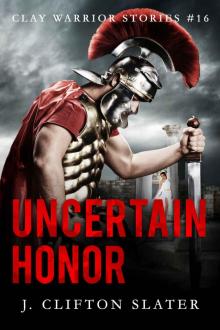 Uncertain Honor
Uncertain Honor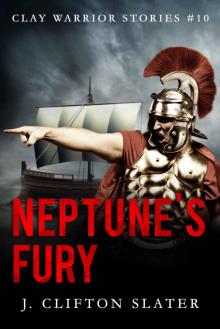 Neptune's Fury
Neptune's Fury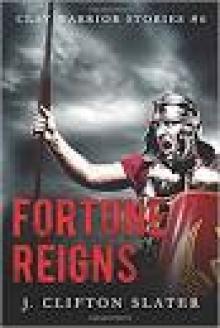 Fortune Reigns
Fortune Reigns Op File Treason
Op File Treason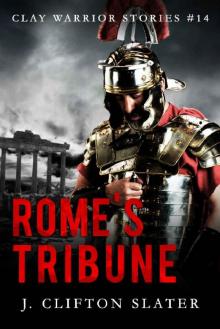 Rome's Tribune (Clay Warrior Stories Book 14)
Rome's Tribune (Clay Warrior Stories Book 14)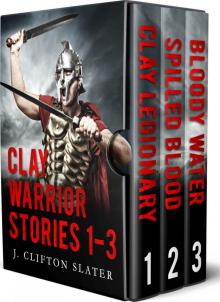 Clay Warrior Stories Boxset 1
Clay Warrior Stories Boxset 1 Serpent Circles
Serpent Circles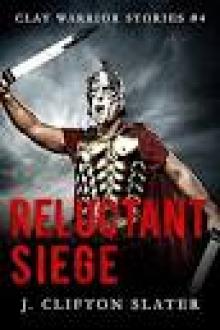 Reluctant Siege
Reluctant Siege Infinite Courage
Infinite Courage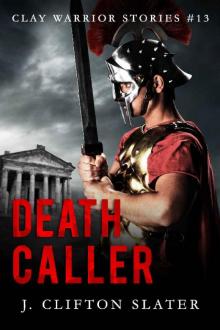 Death Caller (Clay Warrior Stories Book 13)
Death Caller (Clay Warrior Stories Book 13) Op File Sanction
Op File Sanction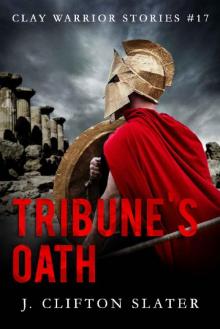 Tribune's Oath (Clay Warrior Stories Book 17)
Tribune's Oath (Clay Warrior Stories Book 17) Galactic Council Realm 1: On Station
Galactic Council Realm 1: On Station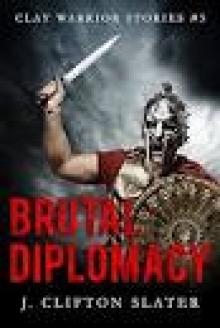 Brutal Diplomacy
Brutal Diplomacy Op File Revenge
Op File Revenge On Point
On Point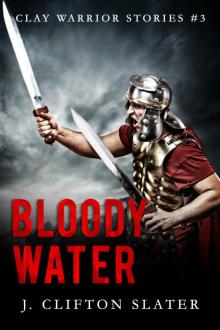 Bloody Water (Clay Warrior Stories Book 3)
Bloody Water (Clay Warrior Stories Book 3)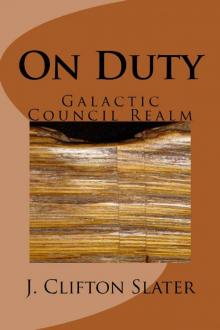 Galactic Council Realm 2: On Duty
Galactic Council Realm 2: On Duty Galactic Council Realm 3: On Guard
Galactic Council Realm 3: On Guard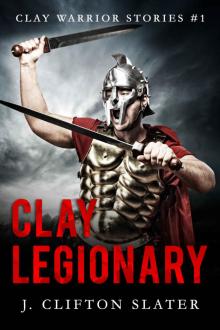 Clay Legionary (Clay Warrior Stories Book 1)
Clay Legionary (Clay Warrior Stories Book 1) On Point (Galactic Council Realm Book 4)
On Point (Galactic Council Realm Book 4) Op File Revenge (Call Sign Warlock Book 1)
Op File Revenge (Call Sign Warlock Book 1)